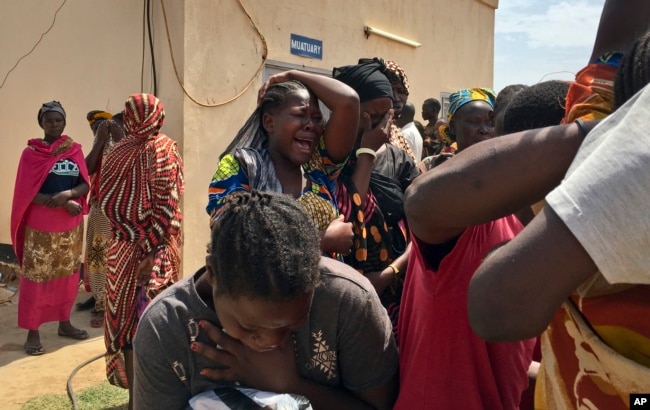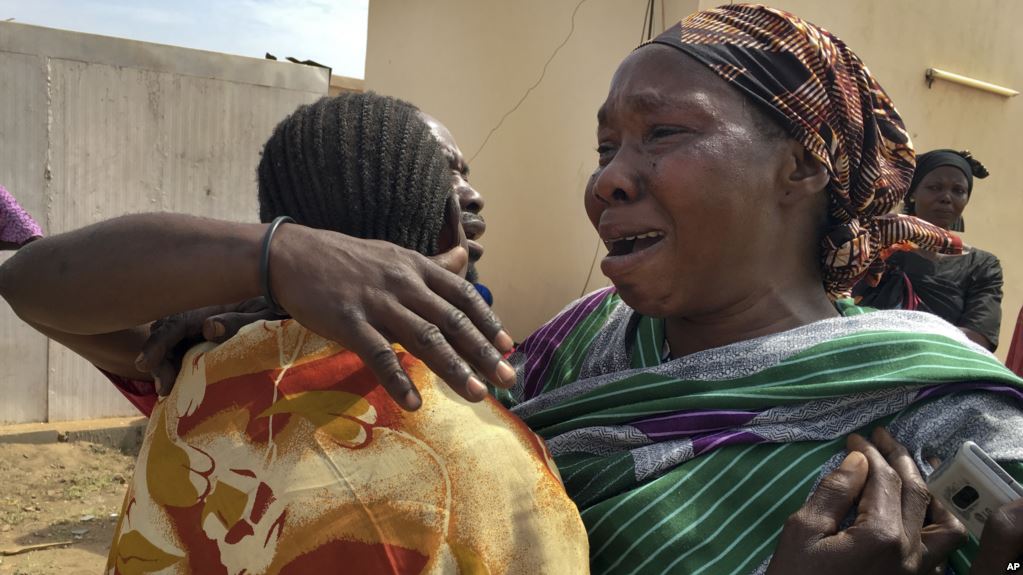Unidentified assailants took the lives of six aid workers in South Sudan on Saturday, the highest number killed in a single incident since South Sudan’s conflict began in December 2013, according to the United Nations.
Working for a local NGO called GREDO, they were killed in the Magri area of Central Equatoria State, as they traveled from South Sudan’s capital, Juba, to the town of Pibor.
GREDO program director Jaffar Mbugua told VOA’s South Sudan in Focus that a seventh person riding with the convoy — a man who had hitched a ride so he could seek construction work — was also killed.
A spokesperson for the U.N.’s Office for the Coordination of Humanitarian Affairs confirmed a seventh person had died.
Motive no so obvious
Jerry Ferrell, the South Sudan representative of Catholic Relief Services, says he does not believe aid groups are being politically targeted. Instead, he says they are likely singled out for the same reasons that perceived wealthy individuals would be.
“Because NGOs have Land Cruisers and very often have Thurayas, or satellite phones, often are carrying cash to the field to pay vendors and pay staff, they are being targeted for those reasons by criminals,” said Ferrell.
But Ken Isaacs, the vice president of programs and government relations at U.S.-based charity Samaritan’s Purse, hesitates to comment on motive.
“There is a lot of nuances and I just know from my own experience doing this for 30 years that it is premature right now to make any speculation about it, but it rarely is as simple as it appears on the surface,” said Isaacs.
South Sudan’s government told VOA’s Daybreak Africa that opposition forces loyal to former First Vice President Riek Machar are responsible for the deaths.
Contacted by VOA, the deputy military spokesman for the opposition SPLA-IO said the area where the incident took place is under the control of the government and allied militia groups.

Relatives of the six slain aid workers grieve in Juba, South Sudan, March 27, 2017. Twelve aid workers have been killed so far this year in South Sudan.
Aid Groups Vow to Continue Work
Samaritan’s Purse had 15 staff members abducted in Mayendit in mid-March by an independent armed faction, but all were rescued shortly thereafter. Isaacs says the weekend’s attack will cause his group to operate at heightened alert.
“So it does not cause us to hesitate, it makes our resolve stronger, but it also makes us more cautious,” said Isaacs. “So we will put certain measures into place, about how we move, when we move, how many vehicles are in a convoy, how many meters distance can be between them, it will affect our movements all over the country.”
The attack also will not prevent the International Committee of the Red Cross from delivering aid to South Sudan, says spokesman Jason Straziuso.
“This extremely tragic incident is at the top of our attention right now. It has added to the latest of the security concerns in South Sudan,” said Straziuso. “But at the same time, given how we operate, because we mostly travel through the air, to carry our personnel, this is not likely to affect our operations, our food assistance, or our medical assistance. We are going to be able to continue this because of the way we travel.”
Resolve strengthened
Ferrell of Catholic Relief Services says the killings have only strengthened the resolve of NGOs working in South Sudan.
“We are doubling down,” said Ferrell. “No, I think that is the case for everyone. It is very, very sad, but everyone is more determined to help people who are in desperate need of assistance.”
Save the Children provided a statement that “while humanitarians will continue to do all that is possible to alleviate suffering and save lives, the fact remains that unless the guns fall silent, the humanitarian situation will continue to deteriorate.”
‘Entirely unacceptable’
The U.N. humanitarian coordinator for South Sudan, Eugene Owusu, said “At a time when humanitarian needs have reached unprecedented levels, it is entirely unacceptable that those who are trying to help are being attacked and killed.”
South Sudan’s Joint Monitoring and Evaluation Commission has asked monitors of the country’s shaky 2015 ceasefire agreement to investigate the incident.
The United Nations says since December 2013, at least 79 aid workers have been killed in South Sudan, including 12 this year.
©VOA



